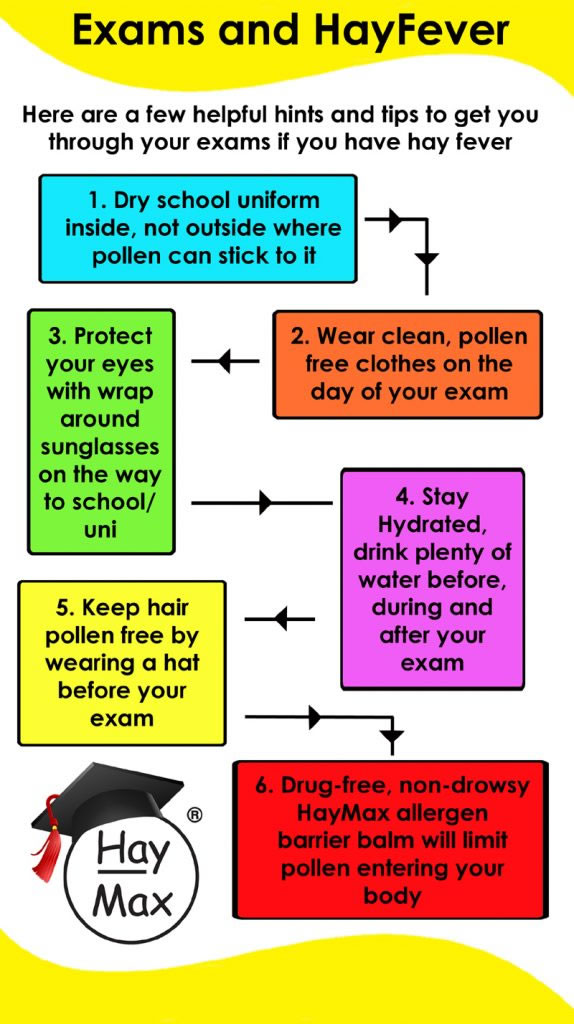
Feeling your best for exams during hay fever season
The impact of hay fever for many students taking exams really cannot be ignored. The peak onset of hayfever happens during adolescence. As many as 63% of students taking exams surveyed by a 2006 survey reported hayfever symptoms. (Survey commissioned by the charity Education for Health).
The study found that students with hayfever were 40% more likely to drop a grade between their mock and final exams and those taking antihistamines were 70% more likely to drop a grade. Students with severe hayfever and a history of symptoms in previous years were twice as likely to drop a grade.
More than 1,800 students aged 15 to 17 were surveyed, all of whom were taking GCSE’s. A total of 28% of students surveyed who were taking medication were using a sedating antihistamine.
The authors of the study recommended that moving the timings of examinations, so as not to be held during the peak hayfever season, be considered.
Hayfever during exams also affects thousands of University students each Summer.
Researchers said old-generation sedating antihistamines have been found to have adverse effects on attention span, working memory, vigilance and speed, as well as higher levels of fatigue and lower levels of motivation and activity. Disturbed sleep could also have a knock on effect the next day.
Visit the NHS Website for lots of useful information on how to recognise hay fever in children, how to distinguish it from other allergies, and how to help your child or children cope with the symptoms.
Tips for teachers:
- If possible, keep classroom windows closed on high pollen count days, and open interior doors instead to allow air flow. This is to limit the amount of pollen that is blown into the classroom.
- Prevailing winds come from the west, so housing the exam in an east-facing hall with the windows closed might help.
- Ensure that classroom carpets are vacuumed every day to remove pollen that has settled. Using vacuum cleaners with HEPA filters ensures that pollen, dust allergens or any other airborne allergens are caught.
- If the school has air conditioned areas consider using these for exams and check that the air conditioning filters exclude pollen.
- Allow children to have water readily available. Staying hydrated is really important for keeping hay fever symptoms under control.
- Encourage kids to tie their hair back away from their faces. Hair traps pollen. This is easier with younger ones, but it’s worth informing teenagers too.
- Read the infographic below for more helpful suggestions for your students.


Exams Case study

William Aslet suffered badly with an extreme form of childhood hayfever many years, affecting his quality of life, going out and playing with friends, staying abroad and even ruining important school exams, until his mum came across a unique drug-free product. Now, 10 years later it’s helping him get through some critical exams at Oxford University…
William Aslet, age 15, began to get hayfever when he was 7. It was an extremely bad form of hayfever, which used to start in the spring when the first pollen began to arrive. “William would get terrible puffy eyes”, explains his mother, Naomi, “it was very bad and debilitating for him – he looked awful and felt terrible, especially during his summer exams. The puffy, running eyes would affect his concentration and the constant sneezing would be both distracting to him and to everyone else in the exam. In hindsight, we should have had him withdrawn from his exams really. It really affected his ability and his performance.”
“We tried giving William various types of hayfever medicines with varying degrees of success”, relates Naomi “– sprays, tablets, all sorts – but nothing seemed to help him, really. Then a friend of mine told me about a new pollen barrier balm called HayMax. I liked the idea because it didn’t make you drowsy, didn’t contain any drugs – which would be good for exam time – and was also completely natural. So we got on the internet and bought one. Since then things have improved considerably.”
“The balm was easy to apply and the minute we started using it we found it really worked for William. It was such a relief for him to dab it under his nose – a lifesaver really. It’s the only thing that works and we can now get it easily from our local Waitrose.”
“When William went to Germany recently, he didn’t have his HayMax with him, so the German family he was staying with had to find something, which wasn’t as good – he was really stuck without it. Now, when William goes away, or off for the day on a hot summer’s day with his friends, he won’t be suffering anymore. He can now enjoy the spring and summer time, instead of constantly worrying about his hayfever. It has made a huge difference. William can relax and so can we, now. I recommend HayMax to anyone I talk to, whether they’re good friends or just on the phone. It’s marvellous stuff.”
Click here to read HayMax testimonials

Pollen Count

Practical Tips

Dietary & Lifestyle









